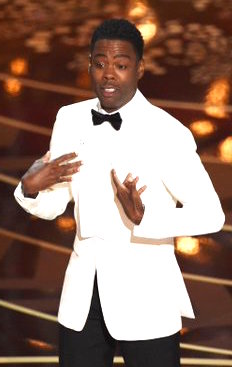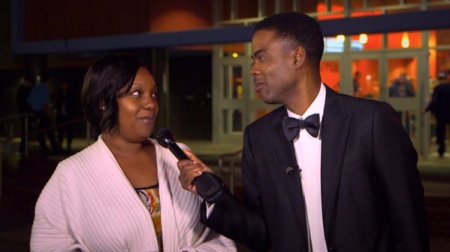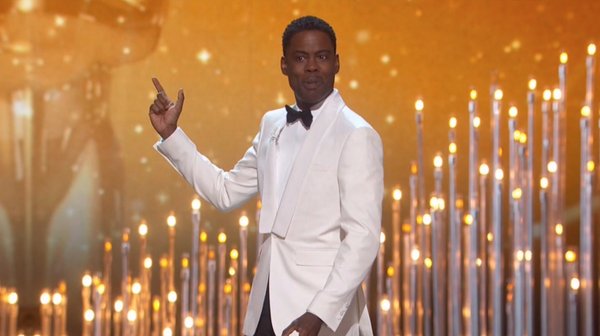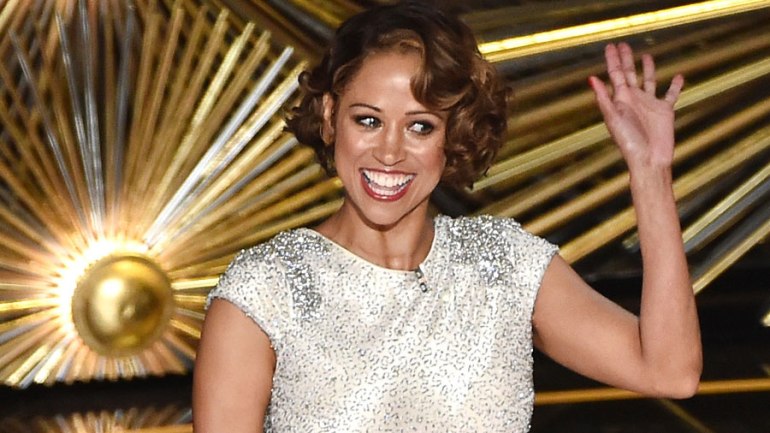 Kieran, here with an extremely stream-of-conscious analysis of the racial politics of last night's ceremony. Bear with me, gentle reader...
Kieran, here with an extremely stream-of-conscious analysis of the racial politics of last night's ceremony. Bear with me, gentle reader...
Chris Rock was in an unenviable position. It’s important to begin with that point because, as Nathaniel has pointed out many times, it’s nearly impossible to get positive reviews as an Oscar host in real time. Even briefly setting aside the identity politics firestorm of stepping into a predominantly white space as a black person, it usually takes at least a year (if not longer) for positive consensus to settle around how an Oscar host performed his or her duties. But let’s get to the white elephant in the room—Chris Rock’s handling of #Oscarssowhite (a hashtag created by activist April Reign). There were many who seemed to be expecting Chris Rock to be some kind of attack-dog, which I will never understand. That’s never been his style and even if it were his style, what does that accomplish?
Chris Rock shaming and berating the audience intermittently for four hours doesn’t move the needle in terms of fair representation in Hollywood. It ensures Rock never gets hired by AMPAS (and probably other companies as well). It sends those who are resentful and resistant to progress home with even more angry resolve in their refusal to accept change. In the era where declarative statements are king, it may be unsatisfying to hear the ceremony’s handling of the Academy’s contentious racial discourse, at least from this Oscar-watcher’s perspective, was a mixed bag. There were certain gags and explorations of interpersonal racial politics that genuinely landed well (the about-face of that Angela Bassett-Jack Black moment was great) and were revealing of something deeper beyond the scope of the ceremony. Conversely, there were elements that fell embarrassingly flat on their face.
Rock’s talking to black movie-going audiences segment has many layers to it, despite seeming rote (which it is in many way). I usually feel very protective when it comes to black people as candid interview subjects, whether it’s for overtly comedic gags or it’s for the local 6 o’clock news. It often feels predatory and there was some of that feeling this time around. The interview subjects general lack of knowledge about the Oscar-nominated Best Pictures surely garnered incredulous chuckles and mocking from a lot of the people in the room. But it does reveal a divide with outreach that actually goes both ways and I wish Rock had taken the extra step to convey that. Firstly, the notion that a lack of knowledge of Oscar-nominated films is a uniquely Black “problem” (if it is indeed a problem) is patently false. There were many white attendees at the Oscar-watching party I attended in Los Angeles who hadn’t seen or even heard of more than half of the nominated films. Chris Rock could have chosen a random shopping mall anywhere in America and found a slew of people of all demographics who haven't heard of more than two of the Best Picture nominees. How many white theater-goers, even ones who routinely make a point of seeing prestige fare (and maybe even work in the industry) skipped Beyond the Lights last year, or only caught it on the tail end of its run because they were finally assured, despite having black stars, that it was "okay" to watch? And lest we bring the box office or scale-of-project argument into the mix, how many theater-goers did the same thing with Straight Outta Compton or (more gallingly) Creed this year? I frankly think the disproportionately vigorous vetting process that "minority" films are subjected to in order to be considered prestige is a huge problem and gets to the heart of implicit structural discrimination of all kinds in Hollywood. It's certainly more worthy of discussion than black people at a theater in Compton not having heard of Brooklyn, which (again) can be argued is a problem of outreach and the way certain films are marketed.

There was a key moment in Rock’s opening monologue where he seemed to be a bit out to sea and at cross purposes with what he was trying to accomplish. Rock is usually very smart and insightful when it comes to explorations of race. I have to believe he very quickly came up with his “Black people didn’t care about the Oscars during the Civil Rights movement because there were bigger things to worry about” (I’m paraphrasing) segment. On first blush it may seem like a joke with a lot of things to mine, but it’s a poorly examined point and falls apart for several different reasons. It feeds into this idea of binary thinking that has too long plagued conversations. This notion that people can’t hold two (or more) ideas and concerns at the same time. Let’s be very clear—there were Black actors working during the Civil Rights movement. Actors like Ruby Dee, Sidney Poitier, Lena Horne, Eartha Kitt, Harry Belafonte, Ossie Davis (the list goes on). Many of these people were actively involved in aspects of the Civil Rights movement. I promise you these performers were thinking about the Oscars and racial politics in Hollywood at large while the Civil Rights movement was happening. The latter frankly informed the former and they were artists who cared about representation. You can’t really separate the two. Politics are personal and for an artist of color there’s nothing more personal than how racial politics enhance or inhibit your ability to create art. One could potentially see what Chris Rock was going for, trying to put things into perspective with the “When your grandmother is hanging from a tree, you’re not really thinking about Best Documentary Short Subject”. However, in a year where there has been so much uproar about the general lack of non-white representation in Hollywood, the Oscars really weren’t the venue to essentially make the intellectually bankrupt “art is not that important” implication. Particularly on the back of Rock’s “We just want the opportunity and not just once” sentiment, which was poignant and truthful.

That “we just want the opportunity and not just once” moment felt like a missed opportunity (ha) to talk about…well, opportunity. The fact that of all the non-white actors who have won Oscars, not one of them has won for a part that was not ascribed to that performer’s race on the page (and I'll hear arguments about Whoopi's Oda Mae Brown, but I disagree) never gets discussed. Not to take anything away from any of those performances. I’m not on the reductive “I’m sick of seeing stories about maids and slaves” wavelength because maids and slaves are human beings too and their stories are no less valid than anyone else’s. But why does it seem such a tall order for Hollywood to produce and the Academy to reward a movie like Still Alice about a black woman when black people get Alzheimer’s too? Why is it hard to envision Hollywood producing and AMPAS rewarding a movie like Black Swan were it about a Latina ballet dancer when steadfast, often dangerous commitment to one’s art is universal? It’s maybe not a sexy or funny point, but it’s one I could have imagined Chris Rock making deftly if he had gone there and it would have given this room full of directors, writers, producers, casting directors and executives some real food for thought. I’m grateful for the conversation about representation in the Academy and Hollywood at large and here’s hoping for deeper, more full examinations and harder more useful questions that get at the heart of who we exclusively tell stories about, why that is and constructive ways to expand those parameters. And no, openly trotting out the tired stereotype that Asians are good at math while waxing comedic about inclusion is not constructive...or comedic, for that matter.
These danishes is good, girl!"
Funniest Gag: I know it’s silly and there’s not a lot of analysis to it, but Tracy Morgan’s Danish Girl moment made me cackle so loud and so long. Plus, given what Morgan has gone through, it's always a joy to see him show up places even further along the road to recovery.

Worst/Weirdest/In Poorest Taste Gag: Stacey Dash’s “Happy Black History Month” moment. I imagine that there were a lot of people in the audience who simply didn’t understand who she was. Of the people who did know who she was, how many were aware of what she now represents in terms of the worst respectability politics in the black community? Not many, I’m guessing. And (maybe I'm reading into it too much) but the look on her face signaled a person having it thrown into sharp relief the reality of her position in Hollywood, or the outskirts of Hollwood as is more accurate. Just poorly thought out from soup to nuts.